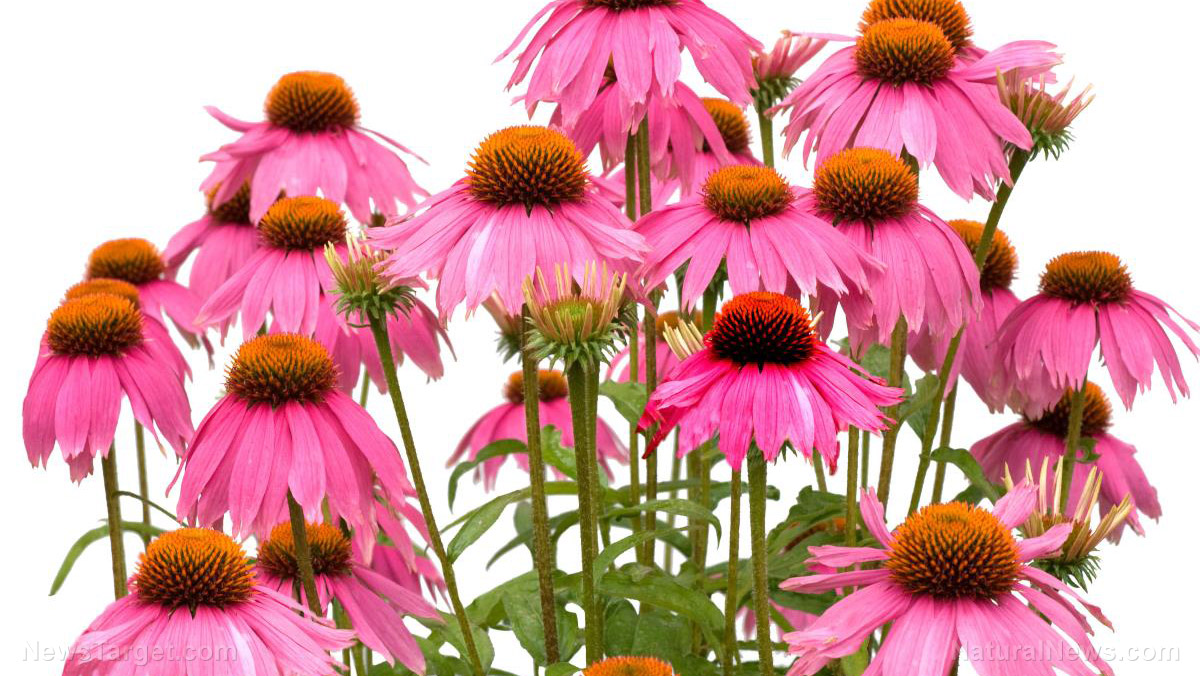3 Science-backed nutritional benefits of echinacea
05/08/2018 / By Rhonda Johansson

The deliciously pink coneflower, otherwise known as echinacea, is one of nature’s power plants (pun intended). Healers from all disciplines recognize the healing potential of echinacea and often prescribe it as an alternative treatment for various conditions. But many skeptics still question whether this popularity is the result of strong scientific research or a just a brilliantly done marketing campaign.
Allow us to put your fears to rest: Numerous studies have documented the therapeutic benefits of this plant. Echinacea contains a wide range of flavonoids, polysaccharides, glycoproteins, and volatile oils that can be used for multiple applications. Listed below are three such uses and the data that support them.
Powerful immune booster
An ounce of prevention is worth a pound of cure. No truer words have been spoken, especially when it comes to echinacea. The plant is largely recommended to improve immunity and prevent (or treat) the common cold along with other respiratory conditions. (Related: Echinacea preparation as effective as Tamiflu in early flu cases in large clinical trial.)
A 2007 meta-analysis concluded that echinacea is indeed effective. Researchers observed around 3,000 patients (with a variety of age) and noted that the plant reduced the risk of catching a cold by 58 percent and reduced its duration by 1.4 days. These results held true regardless of how the individuals caught the cold (ie. naturally exposed to the virus or were inoculated during the study).
Another study, this time in 2010, had similar findings. Echinacea was proven effective in preventing the cold. Participants who did get sick were so for a shorter period if they took an echinacea supplement.
Mother Nature's micronutrient secret: Organic Broccoli Sprout Capsules now available, delivering 280mg of high-density nutrition, including the extraordinary "sulforaphane" and "glucosinolate" nutrients found only in cruciferous healing foods. Every lot laboratory tested. See availability here.
A 2014 study reviewed 24 randomized controlled trials and found that echinacea reduced the risk of catching a cold by 10 to 20 percent.
Potential antifungal agent
Preliminary research has suggested that echinacea is an ideal natural candidate in eliminating bad bacteria in our gut. Echinacea has been shown to lower levels of candida albicans and prevent vaginal yeast infections.
Effective anxiety relief
Early animal trials show that echinacea can decrease levels of anxiety in stressed rats. Human experiments seem to suggest a similar effect: A 2013 study saw that people who took two capsules of echinacea every day for one week were less likely to be anxious.
How to take echinacea
There are many ways to take echinacea. The most popular (and perhaps the easiest) way is to take it as a tea. When you feel the first signs of the flu, it’s best to take around six to eight ounces of echinacea tea up to four times a day.
You may also take it as a tincture (1:5): one to three mL (20 to 90 drops) or part of pressed juice (six to nine mL).
Echinacea is a biennial and is sown from seed. Take note that there are more than 40 varieties of the plant, and the one you should use for medical purposes is Echinacea pupurea. The plant is not super easy to grow so unless you’re an experienced gardener, you may want to opt for supplements instead. That said, make sure that you buy from a reputable store.
Read the nutritional label as well! Not all supplements are the same and the effectiveness of the vitamin is dependent on several factors. Know which part of the plant was used (plant or roots) and which species the supplement included. While Echinacea pupurea is found to have the highest concentration of healthful nutrients, other acceptable species include Echinacea pallida, and Echinacea angustifolia.
Read Herbs.news for extensive coverage of the medicinal properties of herbs.
Sources include:
Tagged Under: antifungal agent, anxiety relief, botanical medicine, cold and flu, cold relief, Echinacea, echinacea extract, herbal medicine, Herbs, immune boosting plant, natural medicine, natural remedies, science of efficacy, supplements




















